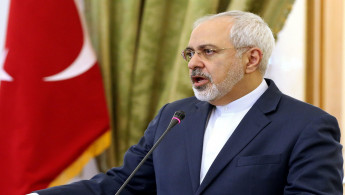Iran and US meet to discuss Tehran's nuclear programme
Iranian Foreign Minister Mohammad Javad Zarif said on Sunday he would meet with his US counterpart, John Kerry, on Wednesday in Geneva to discuss Iran's nuclear programme.
Zarif denied the existence of a thaw in political or diplomatic relations, saying "the only issue to be discussed is Iran's nuclear programme".
There have been no formal diplomatic relations between Iran and the US since 1980, and meetings between officials from the two sides have been rare.
| The only issue to be discussed is Iran's nuclear programme. - Mohammad Javad Zarif, Iranian foreign minister |
"During the meeting, the possibility of expediting talks between Iran and the P5+1 countries in order to achieve real results will be discussed," added Zarif.
The P5+1 powers include the five permanent members of the UN Security Council - the US, the UK, France, Russia and China - plus Germany.
Zarif is set to Russian Deputy Foreign Minister Sergei Ryabkov during his visit to Tehran on Monday, before flying out to visit other European capitals after meeting with Kerry in Geneva on Wednesday.
Zarif described allegations published by German newspaper Der Spiegel that Iran was building a nuclear reactor in Syria in cooperation with North Korea as "ludicrous... Tehran refuses to possess or manufacture nuclear weapons".
Israel accused
Speaking in Vienna last November, Ali Akbar Salehi, head of Iran's Atomic Energy Organisation, accused Israel of hindering efforts to reach an agreement between Iran and the P5+1.
"Iran and the countries of the six-party talks reached an agreement in Vienna last November, but something led them to withdraw from the agreement," he told Iranian TV.
"Israel is behind this, especially as Washington announced at the time that it takes Israeli concerns seriously... It serves the interest of Israel to maintain the nuclear crisis with Iran."
| 'Iran's increasingly bold interventions in the Arab region cannot be regarded positively'. Read Azmi Bishara on 'Iran and the sick man of the Middle East' |
Salehi also revealed Iran's proposals. "The disagreement is about enrichment and the mechanism of lifting sanctions, as well as the West's insistence on reducing the number of centrifuges," he said.
"Tehran has voluntarily agreed to reduce enrichment by 20 percent and maintain only five percent of it," Salehi added.
"There are currently nine centrifuges in operation, even though Iran owns many more. Tehran currently enriches 2.5 tonnes of uranium per year, despite its need for more than 30 tonnes. But the West does not accept Iran's concession."
Russia is to provide fuel for the Bushehr reactor for the next eight years, said Salehi.
"Iran is currently discussing the time period during which it will suspend some of its activities to earn everyone's trust, before it resumes," Salehi said. "The disagreement is currently about the number of years. The West wants a ten to 20 year suspension, which Iran believes is too long."
| [The] talks reached an agreement last November, but something led them to withdraw... Israel is behind this. - Ali Akbar Salehi, Atomic Energy Organisation |
The aging core at the heart of Iran's Arak heavy-water reactor needs to be replaced as it is now too old, he added.
"The West wants to change it to a light-water reactor in order to reduce the amount of plutonium it produces," he said.
Iran is understood to have offered concessions over the heavy-water reactor, such as limiting production of plutonium to one kilogram per year, even though the plant is capable of producing ten kilograms.
"The West is concerned about plutonium because a nuclear weapon only requires a small amount of it," said Salehi.
He also denied any deal existed to transport enriched uranium to Russia.
"Iran is taking its negotiations with the countries of the six-party talks and the International Atomic Energy Agency seriously, but agreement requires real political will from all parties," Salehi concluded.
This is an edited translation from our Arabic edition.





 Follow the Middle East's top stories in English at The New Arab on Google News
Follow the Middle East's top stories in English at The New Arab on Google News


